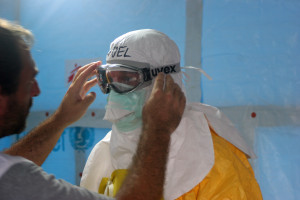Experts urge caution at Ebola’s turning point
 Experts have confirmed that the toll of Ebola-infected people in West Africa has followed a steep, downward trend, inviting speculation that the deadly outbreak may finally be coming to an end. Last week, after 42 days without any newly detected cases, Mali’s health minister Ousmane Kone declared the country Ebola-free. Christopher Dye, Director of Strategy in the Office of the Director-General of the WHO has indicated that Liberia, Guinea and Sierra Leone have also seen a downward trend in the number of infected cases, with recent figures being the “most promising” since the beginning of the outbreak.
Experts have confirmed that the toll of Ebola-infected people in West Africa has followed a steep, downward trend, inviting speculation that the deadly outbreak may finally be coming to an end. Last week, after 42 days without any newly detected cases, Mali’s health minister Ousmane Kone declared the country Ebola-free. Christopher Dye, Director of Strategy in the Office of the Director-General of the WHO has indicated that Liberia, Guinea and Sierra Leone have also seen a downward trend in the number of infected cases, with recent figures being the “most promising” since the beginning of the outbreak.
In Mali, the last infected patient was treated and recovered in a hospital in early December 2014. The country recorded its first case of Ebola two months prior, when a Guinean two-year-old fell victim to the disease and died, and the number of potential cases for official investigation grew to 300 at its peak. Ibrahima Soce, head of the Malian office of the United Nations Mission for Ebola Emergency Response (UMEER), stated last week that Mali had emerged from the epidemic. For a country to be declared Ebola-free, it must have no new cases for 42 days-- that is, two consecutive 21-day incubation periods.
A few hours away, Liberia detected eight cases, down from a peak of 509 in September 2014. Today, Guinea stands at 20 cases per week, from a peak of 292, and Sierra Leone at 117 per week from a peak of 748. Moreover, there have been no cases reported at all in Liberia over the past few days. The apparent decline of cases in Liberia prompted Dye to see this new period as the “turning point” of Ebola in West Africa.
Despite the evident reduction in new cases, the WHO continues to “urge caution and to highlight the need to find and follow those who have been in contact with Ebola patients.” Dye maintained that there must be “no basis for complacency” because the risk of resurgence remains high with viruses like Ebola: one of the main risks that could trigger the resurgence of the outbreak is the failure of appropriate contact tracing. History has shown that one single case of Ebola is enough to restart an entire outbreak; so identifying every individual who comes into contact with the virus is crucial. For this reason, Dye insisted that this was a vital time to carry out the contact tracing programme strictly and correctly.
“We have a very attractive and promising situation that leads us to believe that perhaps we are beginning to see the end of the outbreak,” said David Nabarro, UN system coordinator for Ebola. While recent positive trends do point to a possible end to the disease, precaution and responsibility remain crucial and necessary now more than ever.
